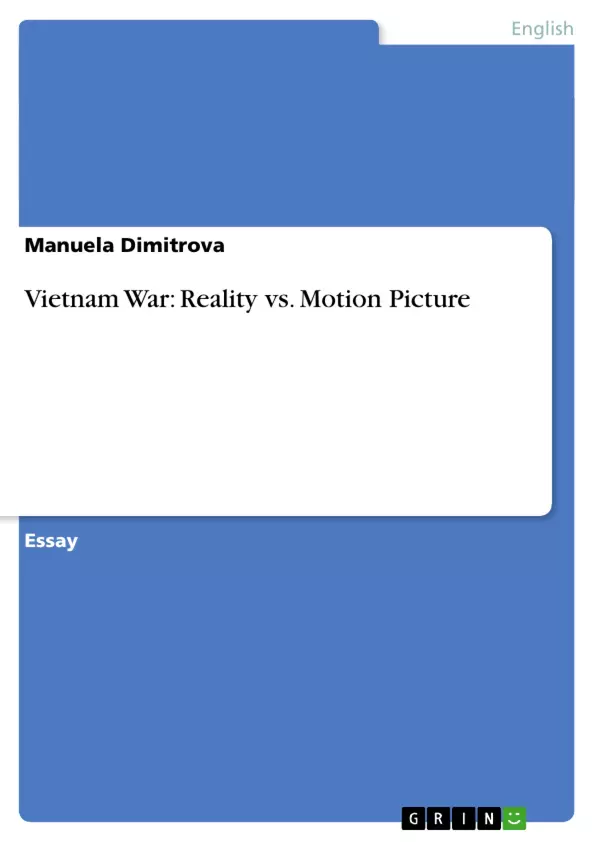During this century the United States has fought four major wars--World Wars I and II, the Korean conflict, and the Vietnam War. The Vietnam War, by far the longest and most divisive of these actions, forced Americans to confront a series of national moral and political dilemmas. It challenged the role of the United States in the world and raised grave questions about how wars should be conducted. The issue of a citizen's obligation to his country during wartime became an acute moral problem for many Americans.
The decade long Vietnam War(1964 – 75) was called by some observers „Johnson’s War“, but President Kennedy had significantly deepened U.S. involvement in Vietnam, where the North assisted the Vietcong in the South to advance the reunification of the country under a Communist government. It was Lyndon B. Johnson who Americanized the war.
For the U.S. proved to be the most damaging one they had ever fought. Washington threw its young men and national wealth into a war it could not and did not win in a country it did not understand. More than 58 000 Americans and some 1, 5 million Vietnamese died; civilian deaths in Cambodia and Laos numbered in millions; it cost the U.S. at least $170 billion and billions more would be paid out in veterans’ benefits. The nation suffered inflation, retreat from reform, political schism, violations of civil liberties, abuse of executive power. The post-traumatic stress disorder befell thousands of the 2, 8 million Vietnam veterans, making their lives a living hell (* Norton: 2001).And all this for what? The “arrogance of power” made Americans like Johnson believe they could run the world.
Growing numbers of people were troubled by the Americanization of the war, especially as television coverage brought it into their homes every night. Veterans publicized their deteriorating health. Feature films on the subject became very popular. Movies like Coming Home(1978), The Deer Hunter(1978), Apocalypse Now(1979), Platoon(1986) and Born on the 4th of July(1989) showed the soldiers’ Vietnam, but did they show also the real war as it was, or did they only present the “convenient” side of the conflict? People tend to close their eyes when things are not as they would like them to be; in the film industry this is especially true.
Inhaltsverzeichnis (Table of Contents)
- The Vietnam War: Reality vs. Motion Picture
- The Vietnam War - A History
- Americanization of the War
- The Impact of the Vietnam War
- The Media's Role in Shaping Public Opinion
- The Reality of the Vietnam War
- Apocalypse Now: A Critique
- Platoon: A Realistic Depiction
- Moral Decay in the Armed Forces
- The Dehumanizing Impact of War
- The My Lai Massacre
Zielsetzung und Themenschwerpunkte (Objectives and Key Themes)
This paper examines the portrayal of the Vietnam War in popular films, focusing on the differences between cinematic representations and historical reality. It explores how these films shape public understanding of the war and its impact on American society.
- The impact of the Vietnam War on American society
- The role of media in shaping public perception of war
- The accuracy of cinematic depictions of the Vietnam War
- The psychological impact of war on soldiers
- The ethical dilemmas and moral complexities of warfare
Zusammenfassung der Kapitel (Chapter Summaries)
The first chapter provides an overview of the Vietnam War, highlighting its significance and impact on American history. The second chapter critiques Francis Ford Coppola's "Apocalypse Now," analyzing its portrayal of the war and its deviation from historical reality. The third chapter explores Oliver Stone's "Platoon" as a more realistic depiction of the war, examining its portrayal of the psychological impact of combat and the moral dilemmas faced by soldiers.
The fourth chapter delves into the moral decay within the U.S. armed forces during the war, highlighting the impact of prolonged conflict and the pressure of constant combat. The final chapter examines the My Lai Massacre, showcasing the brutal realities of war and the ethical implications of American involvement in Vietnam.
Schlüsselwörter (Keywords)
The Vietnam War, film, media, reality vs. fiction, Apocalypse Now, Platoon, psychological impact, moral dilemmas, ethical considerations, My Lai Massacre, American society.
Frequently Asked Questions
How did the Vietnam War differ from previous 20th-century US wars?
The Vietnam War was the longest and most divisive, forcing Americans to confront moral dilemmas and questioning the country's role in the world.
What is the difference between "Apocalypse Now" and historical reality?
While "Apocalypse Now" is a powerful critique of war, it is often viewed as a stylized deviation from the actual historical events in Vietnam.
Is Oliver Stone's "Platoon" considered a realistic war movie?
Yes, "Platoon" is widely regarded as a more realistic depiction, focusing on the psychological impact of combat and moral decay within the ranks.
What was the impact of television coverage on the Vietnam War?
Television brought the war into American living rooms every night, significantly shaping public opinion and increasing opposition to the conflict.
What was the significance of the My Lai Massacre in the war's history?
The My Lai Massacre exposed the brutal realities of the war and raised grave ethical questions about the conduct of the U.S. armed forces.
- Citation du texte
- Manuela Dimitrova (Auteur), 2004, Vietnam War: Reality vs. Motion Picture, Munich, GRIN Verlag, https://www.grin.com/document/32272



